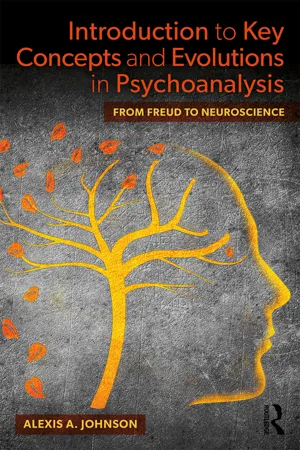
Introduction to Key Concepts and Evolutions in Psychoanalysis
From Freud to Neuroscience
- 186 pages
- English
- ePUB (mobile friendly)
- Available on iOS & Android
Introduction to Key Concepts and Evolutions in Psychoanalysis
From Freud to Neuroscience
About This Book
Introduction to Key Concepts and Evolutions in Psychoanalysis offers an accessible starting point to understanding psychoanalysis by focusing on seven key psychoanalytic models and their creators and how the field has evolved over time from Sigmund Freud's original ideas. The book is based on the premise that Freud started a conversation over 100 years ago that continues to this day: who are we, why do we suffer so, and how can others help?
Alexis A. Johnson seeks to make the invariably complex and sometimes contradictory terms and concepts of psychoanalysis more accessible for those being introduced to psychoanalysis for the first time, integrating them into a cohesive narrative, whilst using a broadly developmental perspective. Each model is given space and context, matched with relevant case studies drawn from the author's own clinical practice.
Written in an approachable, jargon-free style, this book brings to life the creators of the models using case studies to illustrate the 'healing maps' and models they have developed. The author methodically adds layer upon layer of increasingly challenging insights: Which model is useful or appropriate, and when and how exactly is it useful as part of the healing paradigm? Rather than aligning with any one model, Johnson makes the case that drawing upon aspects of all of these sometimes-competing ideas at various times is important and healthy.
Introduction to Key Concepts and Evolutions in Psychoanalysis will appeal to undergraduate students of psychology encountering psychoanalysis for the first time, as well as trainees in psychoanalysis and those working across other branches of the mental health profession wishing to understand and drawn upon fundamental psychoanalytic ideas.
Frequently asked questions
Information
Table of contents
- Cover Page
- Half Title
- Title Page
- Copyright Page
- Dedication
- Table of Contents
- Acknowledgments
- Introduction
- 1 Sigmund Freud: We Are all in Inner Conflict
- 2 The Bridge Between Freud And Modern Psychoanalysis
- 3 Melanie Klein: Life is Terrifying, and We Must Survive
- 4 Anna Freud: We Have Strengths as Well as Conflicts
- 5 The Middle School: With Good Enough Mothering, We Evolve from Ruthless to “Ruth”
- 6 Heinz Kohut: We Always Need Others for Our Well-Being and to Create Meaning
- 7 Harry Sullivan: We Need Relationships to Manage our Anxieties and to Thrive
- 8 John Bowlby: Lost Connection is Traumatic; Secure Attachment is the Key to Well-Being
- 9 Emergent Complexity: Freud to Neuroscience
- Glossary
- Index